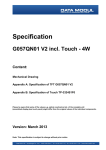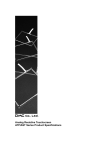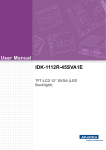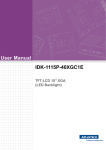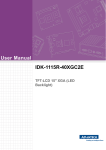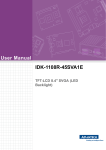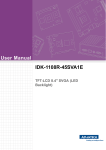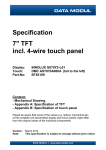Download DMC Analog Resistive Touchscreen ATP/AST Series Specifications
Transcript
Specification G150XG01 V3 incl. Touch - 4W Content: Mechanical Drawing Appendix A: Specification of TFT G150XG01 V3 Appendix B: Specification of Touch AST-150C080A ( Please be aware that some of the values e.g. optical, mechanical etc. of the complete unit (assembled display plus touch panel) might differ from the original values of the individual components. Version: March 2013 N Note: This specification is subject to change without prior notice 1 2 4 3 6 5 7 8 A A 328 ±0,3 ODT 309 VAT 305 AAT 304,10 AAD 14,74 (max. 15,53) 326,50 ±0,5 ODD B D E 228,10 AAD 229 AAT 233 VAT 252 ±0,3 ODT 0,75 ±0,5 80 ±1 NOT TO BE DISCLOSED TO THIRD PARTY WITHOUT PERMISSION FROM C CONRAC GMBH / Data Modul AG Contact 253,50 ±0,5 ODD B C 1,25 ±0,5 1 ODD ODT VAT AAT AAD 3 D Outline Dimension Display Outline Dimension Touch Viewing Area Touch Active Area Touch Active Area Display This drawing is only schematic representation of the structure. The parts to be used are defined in the ProAlpha parts list. 000 REV. NO. OF CHANGES 26.02.2013 Aschenbrenner 10000 Neuanlage DRAWN BY E.C.-NO. REL.DATE MODIFICATION/DESCRIPTION RELEASED: ja FINISH 2 D-97990 Weikersheim M 1:4 F 1 2 Pos. Quantity File Number Description 1 1 1006572-T TFT-LCD 15" 2 1 1009867-T Touch 3 1 1009958-T Klebeband 3x0,13 3 4 MATERIAL DRAWING TITLE D-80687 München Assembly TFT Display 15" + resistive Touch FILE NUMBER: 1009959 PROJECT: DMO_C_ TOLERANCES DIN ISO 2768-mK SURFACES DIN ISO 1302 DRAWING/PART NUMBER 12002656 SCALE 1:3 000 SIZE ISO A3 ( ) Preliminary Specifications ( v ) Final Specifications Module 15 Inch Color TFT-LCD Model Name G150XG01 V3 Customer Date Approved by Vito Huang Checked & Approved by Date 2010/11/16 Prepared by KuoKang Tseng Note: This Specification is subject to change without notice. 2010/11/16 Audio-Video Business Unit / AU Optronics corporation G150XG01 V3 rev 1.0 Data Modul AG - www.data-modul.com 2 1/28 Contents 1. Operating Precautions.....................................................................................4 2. General Description .........................................................................................5 2.1 Display Characteristics...........................................................................................................5 2.2 Optical Characteristics ...........................................................................................................6 3. Functional Block Diagram ...............................................................................9 4. Absolute Maximum Ratings ..........................................................................10 4.1 Absolute Ratings of TFT LCD Module .................................................................................10 4.2 Absolute Ratings of Environment ........................................................................................10 5. Electrical Characteristics ..............................................................................11 5.1 TFT LCD Module .................................................................................................................. 11 5.2 Backlight Unit........................................................................................................................13 6. Signal Characteristic .....................................................................................14 6.1 Pixel Format Image ..............................................................................................................14 6.2 Scanning Direction ...............................................................................................................14 6.3 Signal Description ................................................................................................................15 6.4 The Input Data Format .........................................................................................................16 6.5 Interface Timing ....................................................................................................................18 6.6 Power ON/OFF Sequence ...................................................................................................19 7. Connector & Pin Assignment ........................................................................21 7.1 TFT-LCD Signal: LVDS Interface Connector .......................................................................21 7.2 LED Backlight Unit: LED Driver Connector .........................................................................23 7.3 LED Driver Connector Pin Assignment ...............................................................................23 8. Reliability Test Criteria ..................................................................................24 9. Mechanical Characteristics ...........................................................................25 9.1 LCM Outline Dimension (Front View) ..................................................................................25 9.2 LCM Outline Dimension (Rear View)...................................................................................26 10. Label and Packaging....................................................................................27 10.1 Shipping Label (on the rear side of TFT-LCD display) ......................................................27 10.2 Carton Package .................................................................................................................27 11 Safety.............................................................................................................28 11.1 Sharp Edge Requirements.................................................................................................28 11.2 Materials .............................................................................................................................28 11.3 Capacitors...........................................................................................................................28 11.4 National Test Lab Requirement..........................................................................................28 G150XG01 V3 rev 1.0 Data Modul AG - www.data-modul.com 3 2/28 Record of Revision Version and Date Rev1.0 2010/11/16 Page Old description First Edition New Description G150XG01 V3 rev 1.0 Data Modul AG - www.data-modul.com 4 3/28 1. Operating Precautions 1) Since front polarizer is easily damaged, please be cautious and not to scratch it. 2) Be sure to turn off power supply when inserting or disconnecting from input connector. 3) Wipe off water drop immediately. Long contact with water may cause discoloration or spots. 4) When the panel surface is soiled, wipe it with absorbent cotton or soft cloth. 5) Since the panel is made of glass, it may be broken or cracked if dropped or bumped on hard surface. 6) Since CMOS LSI is used in this module, take care of static electricity and insure human earth when handling. 7) Do not open nor modify the module assembly. 8) Do not press the reflector sheet at the back of the module to any direction. 9) In case if a module has to be put back into the packing container slot after it was taken out from the container, do not press the center of the LED Reflector edge. Instead, press at the far ends of the LED Reflector edge softly. Otherwise the TFT Module may be damaged. 10) At the insertion or removal of the Signal Interface Connector, be sure not to rotate nor tilt the Interface Connector of the TFT Module. 11) TFT-LCD Module is not allowed to be twisted & bent even force is added on module in a very short time. Please design your display product well to avoid external force applying to module by end-user directly. 12) Small amount of materials without flammability grade are used in the TFT-LCD module. The TFT-LCD module should be supplied by power complied with requirements of Limited Power Source (IEC60950 or UL1950), or be applied exemption. 13) Severe temperature condition may result in different luminance, response time. 14) Continuous operating TFT-LCD Module under high temperature environment may accelerate LED light bar exhaustion and reduce luminance dramatically. 15) The data on this specification sheet is applicable when TFT-LCD module is placed in landscape position. 16) Continuous displaying fixed pattern may induce image sticking. It’s recommended to use screen saver or moving content periodically if fixed pattern is displayed on the screen. G150XG01 V3 rev 1.0 Data Modul AG - www.data-modul.com 5 4/28 2. General Description G150XG01 V3 is a Color Active Matrix Liquid Crystal Display composed of a TFT-LCD display, a driver circuit, and a backlight system. The screen format is intended to support XGA (1024(H) x 768(V)) screen and 16.2M (RGB 8-bits) or 262k colors (RGB 6-bits). All input signals are LVDS interface compatible. All design rules of this module can correspond to PSWG standard. G150XG01 V3 is designed for industrial display applications. 2.1 Display Characteristics The following items are characteristics summary on the table under 25 condition: Items Unit Specifications Active Area [mm] 304.128(H) x 228.096(V) Screen Diagonal [inch] 1024x2, 768x2 (RGBW) Pixels H x V Pixel Pitch 15 [mm] 0.297 x 0.297 Pixel Arrangement R.G.B.W. Rectangle Display Mode TN, Normally White Nominal Input Voltage VDD [Volt] 3.3 typ. Typical Power Consumption [Watt] 9.63 ( 64 Gray Bar pattern) Weight [Grams] 1000g (max.) Physical Size [mm] 326.5(H)x 253.5(V) x 13.1(D) (max.) Electrical Interface 1 channel LVDS Surface Treatment Anti-glare, Hardness 3H Support Color 16.2M / 262K colors Temperature Range Operating Storage (Non-Operating) RoHS Compliance [ C] [oC] o -30 to +85 -30 to +85 RoHS Compliance G150XG01 V3 rev 1.0 Data Modul AG - www.data-modul.com 6 5/28 vengdistac 1with50cm 2.2 Optical Characteristics The optical characteristics are measured under stable conditions at 25 Item Unit Conditions [cd/m2] 100% Dimming White Luminance (center point) Uniformity Contrast Ratio Cross talk Response Time Viewing Angle % 9 Points % [msec] [msec] [msec] Rising Falling Raising + Falling 1 75 80 - 1, 2, 3 400 700 - 4 - 5.7 - 8 1.2 - 2.3 1.5 70 80 - [degree] [degree] Vertical CR = 10 (Upper) (Lower) 50 60 - 0.577 0.627 0.677 0.288 0.338 0.388 Green x Green y Blue x Blue y % 70 70 0.298 0.539 0.100 0.029 0.263 0.279 - - 80 80 0.348 0.589 0.150 0.079 0.313 0.329 60 2.2 5 6 (Right) (Left) White y Gamma Value - Horizontal CR = 10 White x Color Gamut 400 [degree] [degree] Red y Note 320 - Red x Color / Chromaticity Coordinates (CIE 1931) (Room Temperature): Min. Typ. Max. - 7 - 0.398 0.639 0.200 0.129 0.363 0.379 - 8 Note 1: Measurement method Equipment Pattern Generator, Power Supply, Digital Voltmeter, Luminance meter (SR_3 or equivalent) Aperture Test Point Environment Center < 1 lux LCD Module SR_3 or equivalent Measuring distance Module Driving Equipment Data Modul AG - www.data-modul.com G150XG01 V3 rev 1.0 7 6/28 Note 2: Definition of 9 points position (Display active area : 304.128(H) x 228.096(V)) 90 % 50 % 10 % 10 % 50 % 90 % Note 3: The luminance uniformity of 9 points is defined by dividing the minimum luminance values by the maximum test point luminance Minimum Brightness of nine points δW9 = Maximum Brightness of nine points Note 4: Definition of contrast ratio (CR): Contrast ratio (CR)= Brightness on the “White” state Brightness on the “Black” state Note 5: Definition of cross talk (CT) CT = | YB – YA | / YA × 100 (%) Where YA = Luminance of measured location without gray level 0 pattern (cd/m2) YB = Luminance of measured location with gray level 0 pattern (cd/m2) 1/2 1/6 2/3 1/6 A B 1/2 1/3 1/6 A’ 1/2 184 gray level 1/6 1/3 B’ 1/2 2/3 G150XG01 V3 rev 1.0 Data Modul AG - www.data-modul.com 8 7/28 eurntofcasri#10,thescrn,ovea180°hrizontlad180° Viewngalsthm Note 6: Definition of response time: The output signals of photo detector are measured when the input signals are changed from “White” to “Black” (falling time) and from “Black” to “White” (rising time), respectively. The response time interval is between 10% and 90% of amplitudes. Please refer to the figure as below. Optical response Tr Tf % 100 90 White Black White 10 0 Note 7: Definition of viewing angle vertical range (off-normal viewing angles). The 180° viewing angle range is broken down as below: 90° (θ) horizontal left and right, and 90° (Φ) vertical high (up) and low (down). The measurement direction is typically perpendicular to the display surface with the screen rotated to its center to develop the desired measurement viewing angle. Note 8: Note 8: Definition of Gamma Value Generally, Gamma Value is defined as the slope of a Gray Level – Luminance curve in log-log space, that is γ= d log(Luminance) / d log(Gray Level) The Gamma Value defined in this spec is Linear Regression (γ1, γ2, γ3…, γ16). γ1 toγ16 are the section gamma of the following 17 sampling points, GL(0), GL(16), GL(32), GL(48), GL(64), GL(80), GL(96), GL(112), GL(128), GL(144), GL(160), GL(176), GL(192), GL(208), GL(224), GL(240) and GL(255), in 8 bits input. G150XG01 V3 rev 1.0 Data Modul AG - www.data-modul.com 9 8/28 3. Functional Block Diagram The following diagram shows the functional block of the 15 inch color TFT/LCD module: DC/DC Converter AU ASIC Timing Controller Receiver LED Connector + 12V RSDS Transmitter D1 Y-Driver IC LVDS G1 Gate Driver IC LVDS LVDS Connector + 3.3V Gamma Correction Source Driver IC TFT-LCD 1024(2)*768(2) Pixels LED B/L LED Driver G150XG01 V3 rev 1.0 Data Modul AG - www.data-modul.com 10 9/28 Bulbshode397anocdestin. 4. Absolute Maximum Ratings 4.1 Absolute Ratings of TFT LCD Module Item Logic/LCD Drive Voltage Symbol Vin Min - 0.3 Max Unit +3.6 [Volt] Max Unit 4.2 Absolute Ratings of Environment Item Operating Temperature Symbol TOP Operation Humidity HOP Storage Humidity HST Storage Temperature Note: Maximum Wet- TST Min -30 8 -30 8 +85 [ C] o 90 [%RH] 90 [%RH] +85 [oC] G150XG01 V3 rev 1.0 Data Modul AG - www.data-modul.com 11 10/28 5. Electrical Characteristics 5.1 TFT LCD Module 5.1.1 Power Specification Symbol Parameter Min Typ Max Units 3.0 3.3 3.6 [Volt] VDD Logic/LCD Drive Voltage IDD VDD Current - 700 840 [mA] Irush LCD Inrush Current - - 3 [A] PDD VDD Power - 2.31 2.77 [Watt] Remark ±10% 64 Gray Bar Pattern (VDD=3.3V, at 60Hz) Note 1 64 Gray Bar Pattern (VDD=3.3V, at 60Hz) Note 1: Measurement condition: +3.3V D6 D5 D2 D1 Q3 AO6402 R2 2 S C3 R2 1 Q3 AO6402 G +12.0V SW MAG-SPST (LCD Module Input) D1 D2 D5 D6 C1 1uF/16V 1K SW1 VDD VCC G R1 47K (High to Low) Control Signal F1 S VR1 0.01uF/25V 47K 1K C2 1uF/25V 3.3V 90% 0V 10% 500 us VDD rising time 64 Gray pattern G150XG01 V3 rev 1.0 Data Modul AG - www.data-modul.com 12 11/28 5.1.2 Signal Electrical Characteristics Input signals shall be low or Hi-Z state when VDD is off. Symbol Item Min. Typ. Max. Unit Remark VTH Differential Input High Threshold - - 100 [mV] VCM=1.2V VTL Differential Input Low Threshold 100 - - [mV] VCM=1.2V Input Differential Voltage 100 400 600 [mV] Differential Input Common Mode Voltage 1.15 1.2 1.45 [V] |VID| VICM VTH/VTL=±100mV Note: LVDS Signal Waveform. G150XG01 V3 rev 1.0 Data Modul AG - www.data-modul.com 13 12/28 5.2 Backlight Unit 5.2.1 Parameter guideline for LED Following characteristics are measured under stable condition using a LED driving board at 25 Symbol Parameter Min Typ Max Unit Vcc Input Voltage 10.8 12 12.6 Volt Ivcc Input Curent - 0.61 - A PLED Power Consumption - 7.32 10 Watt FPWM PWM Dimming Frequency 200 - 20k Hz Swing Voltage 4.5 5 5.5 5 - 100 2.0 5 5.5 - 80 84 mA 50000 - - Hrs Dimming Duty Cycle Vanalog IF Operating Life Analog Dimming Voltage LED Forward Current Note 1: Ta means ambient temperature of TFT-LCD module. % >(Ro om Temperature). Remark 100% Dimming 100% Dimming 5V, 100% Brightness Ta = 25 C o Ta = 25 C o Note 2: If G150XG01 V3 module is driven at high ambient temperature & humidity condition. The operating life will be reduced. Note 3: Operating life means brightness goes down to 50% initial brightness. Min. operating life time is estimated data. G150XG01 V3 rev 1.0 Data Modul AG - www.data-modul.com 14 13/28 6. Signal Characteristic 6.1 Pixel Format Image Following figure shows the relationship between input signal and LCD pixel format. 6.2 Scanning Direction The following figures show the image seen from the front view. The arrow indicates the direction of scan. AUO AUO Fig. 1 Normal scan (Pin4, REV = Low or NC) Fig. 2 Reverse scan (Pin4, REV = High) G150XG01 V3 rev 1.0 Data Modul AG - www.data-modul.com 15 14/28 6.3 Signal Description The module using a pair of LVDS receiver SN75LVDS82(Texas Instruments) or compatible. LVDS is a differential signal technology for LCD interface and high speed data transfer device. Transmitter shall be SN75LVDS83(negative edge sampling) or compatible. The first LVDS port(RxOxxx) transmits odd pixels while the second LVDS port(RxExxx) transmits even pixels. Input Signal Interface Pin No. 1 2 3 4 5 6 7 8 9 Symbol Description VDD Power Supply, 3.3V (typical) VDD GND REV Rin0- Rin0+ GND Rin1- Rin1+ 10 GND 12 Rin2+ 11 13 14 15 16 17 18 19 20 Rin2GND ClkIN- ClkIN+ GND Rin3- Rin3+ NC/GND SEL68 Power Supply, 3.3V (typical) Ground Reverse Scan [H: Enable; L/NC: Disable]*Note1,3 - LVDS differential data input + LVDS differential data input Ground - LVDS differential data input + LVDS differential data input Ground - LVDS differential data input + LVDS differential data input Ground - LVDS differential clock input + LVDS differential clock input Ground - LVDS differential data input *Note2 - LVDS differential data input *Note2 Reserved for AUO internal test. Please set it as NC or Ground. Selection for 6 bits/8bits LVDS data input[H/NC: 6bits, L: 8bits]*Note1,3 Note 1: Input signals shall be in low status when VDD is off. Note 2: For 6bits input mode, pin 17 and pin 18 must be floated. Note 3: High stands for “3.3V”, Low stands for “0V”, NC stands for “No Connection”. G150XG01 V3 rev 1.0 Data Modul AG - www.data-modul.com 16 15/28 6.4 The Input Data Format 6.4.1 SEL68 SEL68 = ”High” or “NC” for 6 bits LVDS Input SEL68 = “Low” for 8 bits LVDS Input Signal Name R7 R6 R5 R4 R3 R2 R1 R0 G7 G6 G5 G4 G3 G2 G1 G0 Red Data 7 Red Data 6 Red Data 5 Red Data 4 Red Data 3 Red Data 2 Red Data 1 Red Data 0 Green Data 7 Green Data 6 Green Data 5 Green Data 4 Green Data 3 Green Data 2 Green Data 1 Green Data 0 Description Red-pixel Data Remark For 6Bits LVDS input MSB: R5 ; LSB: R0 For 8Bits LVDS input MSB: R7 ; LSB: R0 Green-pixel Data For 6Bits LVDS input MSB: G5 ; LSB: G0 For 8Bits LVDS input MSB: G7 ; LSB: G0 G150XG01 V3 rev 1.0 Data Modul AG - www.data-modul.com 17 16/28 B7 B6 B5 B4 B3 B2 B1 B0 RxCLKIN Blue Data 7 Blue Data 6 Blue Data 5 Blue Data 4 Blue Data 3 Blue Data 2 Blue Data 1 Blue Data 0 LVDS Data Clock DE Data Enable Signal Blue-pixel Data For 6Bits LVDS input MSB: B5 ; LSB: B0 For 8Bits LVDS input MSB: B7 ; LSB: B0 The typical frequency is 65MHz. The signal is used to strobe the pixel data and DE signals. All pixel data shall be valid at the falling edge when the DE signal is high. When the signal is high, the pixel data shall be valid to be displayed. Note: Output signals from any system shall be low or Hi-Z state when VDD is off. G150XG01 V3 rev 1.0 Data Modul AG - www.data-modul.com 18 17/28 6.5 Interface Timing 6.5.1 Timing Characteristics Signal Clock Timing Vsync Timing Hsync Timing Parameter Symbol Clock frequency 1/ TClock Vertical Section Horizontal Section Period TV Active TVD Blanking TVB Period TH Active THD Blanking THB Frame Rate F Min. 50 Typ. 65 Max. 80 776 806 1023 - 768 - 8 38 255 1074 1344 2047 - 1024 - 50 320 1023 50 60 75 Unit MHz TLine TClock Hz Note: DE mode only. Note : Typical value refer to VESA STANDARD 6.5.2 Input Timing Diagram G150XG01 V3 rev 1.0 Data Modul AG - www.data-modul.com 19 18/28 6.6 Power ON/OFF Sequence VDD power and LED on/off sequence is as below. Interface signals are also shown in the chart. Signals from any system shall be Hi-Z state or low level when VDD is off. Power ON/OFF sequence timing Parameter T1 T2 Value Min. Typ. Max. 30 40 50 0.5 - 10 - - 0.5 T3 200 T5 10 T4 T6 T7 10 [ms] - [ms] - [ms] [ms] [ms] - [ms] - - 10 [ms] 0 16 50 1000 - - T10 110 T12 - T13 - [ms] - 10 T11 - 10 0 T8 T9 - Units - - - [ms] - [ms] 10 [ms] [ms] [ms] The above on/off sequence should be applied to avoid abnormal function in the display. Please make sure to turn off G150XG01 V3 rev 1.0 Data Modul AG - www.data-modul.com 20 19/28 the power when you plug the cable into the input connector or pull the cable out of the connector. G150XG01 V3 rev 1.0 Data Modul AG - www.data-modul.com 21 20/28 7. Connector & Pin Assignment Physical interface is described as for the connector on module. These connectors are capable of accommodating the following signals and will be following components. 7.1 TFT-LCD Signal: LVDS Interface Connector Connector Name / Designation Signal Connector Connector Model Number MSB240420-E Manufacturer Mating Housing Part Number Pin# 1 3 5 7 9 11 13 15 17 19 Signal Name STM or compatible P240420 or compatible Pin# Signal Name VDD 2 VDD Rin0- 6 Rin0+ Rin1+ 10 GND 14 ClkIN- Rin3- 18 Rin3+ REV GND 4 GND 8 Rin1- Rin2- 12 Rin2+ ClkIN+ 16 NC/GND 20 GND GND SEL68 G150XG01 V3 rev 1.0 Data Modul AG - www.data-modul.com 22 21/28 7.1.1 Connector Illustration SEL68 G150XG01 V3 rev 1.0 Data Modul AG - www.data-modul.com 23 22/28 7.2 LED Backlight Unit: LED Driver Connector Connector Name / Designation LED Connector Manufacturer E&T or compatible Connector Model Number 3808K-F05N-02R or compatible Mating Connector Model Number H208K-P05N-02B or compatible 7.3 LED Driver Connector Pin Assignment Pin# Symbol Signal Name 2 GND GND 1 3 4 5 Vcc Enable Dimming NC 12V 5V-On / 0V-Off PWM Dimming or Analog Dimming NC G150XG01 V3 rev 1.0 Data Modul AG - www.data-modul.com 24 23/28 /0,3m B hoinur6s0,1cyles 8. Reliability Test Criteria Items Temperature Humidity Bias High Temperature Operation Low Temperature Operation Hot Storage Cold Storage Thermal Shock Test Shock Test (Non-Operating) Required Condition 50 80%,300 hours 85 ,300 hours -3 ,300 hours 85 -3 -2 50G,20ms,Half-sine wave,( ±X, ±Y, ±Z) Vibration Test (Non-Operating) 1.5G, (10~200Hz, P-P) On/off test On/10 sec, Off/10 sec, 30,000 cycles ESD Note 30 mins/axis (X, Y, Z) Contact Discharge: ± 8KV, 150pF(330Ω ) 1sec, 8 points, 25 times/ point Air Discharge: ± 15KV, 150pF(330Ω ) 1sec, 8 points, 25 times/ point Note 1 Note1: According to EN61000-4-2, ESD class B: Some performance degradation allowed. No data lost . Self-recoverable. No hardware failures. G150XG01 V3 rev 1.0 Data Modul AG - www.data-modul.com 25 24/28 9.1 LCM Outline Dimension (Front View) 9. Mechanical Characteristics Data Modul AG - www.data-modul.com 26 25/28 G150XG01 V3 rev 1.0 9.2 LCM Outline Dimension (Rear View) Data Modul AG - www.data-modul.com 27 26/28 G150XG01 V3 rev 1.0 10. Label and Packaging 10.1 Shipping Label (on the rear side of TFT-LCD display) V.3 10.2 Carton Package Max capacity: 12pcs TFT-LCD module per carton Max weight: 20 kg per carton Outside dimension of carton: 375(L)mm* 430(W)mm* 353(H)mm G150XG01 V3 rev 1.0 Data Modul AG - www.data-modul.com 28 27/28 11 Safety 11.1 Sharp Edge Requirements There will be no sharp edges or comers on the display assembly that could cause injury. 11.2 Materials 11.2.1 Toxicity There will be no carcinogenic materials used anywhere in the display module. If toxic materials are used, they will be reviewed and approved by the responsible AUO toxicologist. 11.2.2 Flammability All components including electrical components that do not meet the flammability grade UL94-V1 in the module will complete the flammability rating exception approval process. The printed circuit board will be made from material rated 94-V1 or better. The actual UL flammability rating will be printed on the printed circuit board. 11.3 Capacitors If any polarized capacitors are used in the display assembly, provisions will be made to keep them from being inserted backwards. 11.4 National Test Lab Requirement The display module will satisfy all requirements for compliance to: UL 1950, First Edition U.S.A. Information Technology Equipment G150XG01 V3 rev 1.0 Data Modul AG - www.data-modul.com 29 28/28 Specification AST/ATP Series Revision 11 Version March 23, 2010 Data Modul AG - www.data-modul.com Table of Contents 1. Product Specifications ...........................................................................................................................3 1-1. Product Applicable .............................................................................................................................3 1-2. Structure.............................................................................................................................................3 1-3. Environmental Specifications .............................................................................................................3 1-4. Mechanical Characteristics ................................................................................................................3 1-5. Electrical Characteristics ....................................................................................................................3 1-6. Appearance ........................................................................................................................................4 2. Testing Regulation ..................................................................................................................................5 2-1. Testing Regulation..............................................................................................................................5 2-2. Environmental Specifications .............................................................................................................5 2-3. Mechanical Characteristics ................................................................................................................5 2-4. Electrical Characteristics ....................................................................................................................6 2-5. Appearance ........................................................................................................................................6 3. Reliability Condition ...............................................................................................................................7 3-1. Temperature Condition .......................................................................................................................7 4. Recommended Connector .....................................................................................................................7 4-1. Recommended Connector .................................................................................................................7 5. Handling Notes........................................................................................................................................8 5-1. Precautions ........................................................................................................................................8 5-2. Handling Notes...................................................................................................................................8 5-3. Construction Notes.............................................................................................................................8 5-4. Electrical & Software Notice ...............................................................................................................8 5-5. Mounting Notes ..................................................................................................................................9 6. Warranty ................................................................................................................................................10 6-1. Warranty Period ...............................................................................................................................10 6-2. Warranty Target................................................................................................................................10 6-3. Warranty Exceptions ........................................................................................................................10 6-4. Tools.................................................................................................................................................10 6-5. Changes...........................................................................................................................................10 7. Revision history .................................................................................................................................... 11 2 Rev. 11©1999 - 2010 DMC Co., Ltd. Data Modul AG - www.data-modul.com 2 1. Product Specifications 1-1. Product Applicable § This specification is applied to the analog resistive touchscreen: ATP/AST Series. 1-2. Structure § Dimensions, structure, and shape are referred on the drawing attached. 1-3. Environmental Specifications Specification Value Operating Temperature -20°C to 70°C (no condensation) Operating Humidity -20°C to 60°C Less than 90%RH (no condensation) 3 Exceeding 60°C 133.8g/m (no condensation) Storage Temperature -40°C to 80°C (no condensation) Storage Humidity -40°C to 60°C Less than 95%RH (no condensation) Exceeding 60°C 142.9g/m3 (no condensation) Chemical Resistance (top surface) Toluene, Tricholoroethylene, Athetone, Alcohol, Gasoline, Machine Oil, Ammonia, Glass Cleaner, Mayonnaise, Ketchup, Wine, Salad Oil, Vinegar, Lipstick, etc. 1-4. Mechanical Characteristics Specification Value Activation Force 0.05N to 0.8N Operating Life Input (finger) 10,000,000 hits Character Input (pen) 100,000 characters Light Transmittance Over 80% (typical value at full wavelength) Surface Hardness Over 2H (by JIS pencil hardness) 1-5. Electrical Characteristics Specification Value Maximum Voltage Maximum Current Linearity Terminal Resistance Insulation Resistance Chattering DC6V Top Electrode 100mA Bottom Electrode 100mA Between the Top and Bottom 0.5mA Under ±2% (Under ±1% (typical value)) Top Electrode Less than 1kΩ Bottom Electrode Less than 1kΩ Neighboring Terminals Over 20MΩ at 25V Active Area Electrodes Over 20MΩ at 25V Less than 10msec at ON/OFF. 3 Rev. 11©1999 - 2010 DMC Co., Ltd. Data Modul AG - www.data-modul.com 3 1-6. Appearance § Scratch, dust (W = width, L = length, D = average diameter = (longest + shortest) /2) Item Width (mm) Length (mm) Acceptable Numbers Linear(Scratch/Dust) Over 0.1mm in diameter refer to the Circular. 0.1≥W>0.05 4≥L 1pcs in φ30mm 0.05≥W>0.03 10≥L 2pcs in φ20mm 0.03≥W 20≥L Acceptable Circular (Scratch/Dust) 0.4≥D>0.3 *1 1pcs in viewing area *1 0.3≥D>0.2 2pcs in φ30mm 0.2≥D Acceptable Total Within 5pcs /panel Applied only in the Active Area. Scratches or dusts in the outside of the Active Area are acceptable unless the electrical characteristics are affected. *1 Applied to the size of 14 inches or more. § Dirt Acceptable if not noticeable on a black mat. § Tip, crack (t = glass thickness) (applicable only for the glass) Item Size (mm) Z Corner X Y X Y Side Z Acceptable Numbers X ≤3 Y ≤3 Z ≤t X ≤5 Y ≤3 Z ≤t Crack 2pcs /panel 2pcs /side Not acceptable 4 Rev. 11©1999 - 2010 DMC Co., Ltd. Data Modul AG - www.data-modul.com 4 2. Testing Regulation 2-1. Testing Regulation § If the regulation is not specified, the test is performed under the supplier’s regulation. § Tests are performed under the room temperature unless specified. The room temperature is referred as follows: Temperature: 20°C±5°C Humidity: 65%±10%RH 2-2. Environmental Specifications § Chemical Resistance Test Condition: Tested after leaving the chemical on the surface for 12 hours being wiped off by cloth. Judgement: Must be no effect in appearance. 2-3. Mechanical Characteristics § Activation Force Test Condition: Judgement: Measured by depressing the point between the dots to the conduction by the testing rod (Figure 1). Must satisfy the specification. Silicon Rubber (Hardness: 60°) Tip: R = 4.0 § Operating Life Test (Finger) Condition: Testing rod: Refer to Figure 1 Voltage: DC5V Load: 3N Cycle: 2 hits/sec Judgement: Must satisfy the following: Activation Force: Linearity: Terminal Resistance: Insulation Resistance: Figure 1. Testing rod 1 Must satisfy the specification. Must satisfy the specification. Must satisfy the specification. Must satisfy the specification. § Operating Life Test (Pen) Condition: Testing rod: Refer to Figure 2 Voltage: DC5V Load: 2.5N Input size: 10 x 10 mm Input character: A to Z/minute Judgement: Must satisfy the following: Activation Force: Linearity: Terminal Resistance: Insulation Resistance: Polyacetal resin Tip: R = 0.8 Figure 2. Testing rod 2 Must satisfy the specification. Must satisfy the specification. Must satisfy the specification. Must satisfy the specification. 5 Rev. 11©1999 - 2010 DMC Co., Ltd. Data Modul AG - www.data-modul.com 5 2-4. Electrical Characteristics § Terminal Resistance Test Condition: Top and bottom electrodes are measured at the terminal. Judgement: Must satisfy the specification. § Insulation Resistance Test Neighboring Terminals: Measured by applying the reference voltage to the terminals Active Area Electrodes: Measured by applying the reference voltage to the top and bottom electrodes. Judgement: Must satisfy the specification. 2-5. Appearance § Appearance Test Condition: Tested by an examiner with over 1.0 eyesight at 30cm away from the product under the transmittable light at over 60° the surface of the product. Judgement: Must satisfy the specification. Data Modul AG - www.data-modul.com 6 3. Reliability Condition 3-1. Temperature Condition § Temperature Condition Test Following test are performed in the condition with no dew condensation: Cold Test: Tested after leaving the parts in -40°C±3°C for 240 hours and in the room temperature for 2 hours. Heat Test: Tested after leaving the parts in 80°C±3°C for 240 hours and in the room temperature for 2 hours. Humidity Test: Tested after leaving the parts in the temperature 60°C±3°C, humidity 90 to 95% for 240 hours and in the room temperature for 2 hours. Cycle Test: Tested after 5 cycles of leaving the parts in the temperature -30°C±3°C for 1 hour and in the room temperature for 0.5 hours, then leaving the parts in the temperature 70°C±3°C for 1 hour and in the room temperature for 0.5 hours. Judgement: Must satisfy the following: Activation Force: Must satisfy the specification. Linearity: Must satisfy the specification. Terminal Resistance: Must satisfy the specification. Insulation Resistance: Must satisfy the specification. Appearance: Must satisfy the specification. 4. Recommended Connector 4-1. Recommended Connector Part No. Pins Pitch KCA-K4R 4 pin Double-sided 1.25mm 7 Rev. 11©1999 - 2010 DMC Co., Ltd. Data Modul AG - www.data-modul.com 7 5. Handling Notes 5-1. Precautions § This product is intended for use in standard applications (computers, office automation, and other office equipment, industrial, communications, and measurement equipment, personal and household devices, etc.) Please avoid using this product for special applications where failure or abnormal operation may directly affect human lives, or cause physical injury or property damage, or where extremely high levels of reliability are required (such as aerospace systems, vehicle operating control, atomic energy controls, medical devices for life support, etc.). 5-2. Handling Notes § Do not depress or scratch the product with any object with a sharp edge or end. § Do not forcibly bend or fold the product. § When the product is stored, make sure it is packed in a packing box and stored in a storage temperature range, eliminating any outside load. § Do not use or store the product under a condition where the product will be exposed to water, organic solution or acid. § Do not use the product under the direct sunlight. § Do not disassemble the product. § When you handle the product, Hold the product by its body. Do not hold by the tail. § Clean the product with a soft cloth or a soft cloth with neutral detergent or alcohol. When contaminated by chemicals, wipe them off immediately with caution not to cause injury to human body. § The edge of the glass is not rounded and may cause injury. 5-3. Construction Notes § The environmental specifications, mechanical characteristics, and electrical characteristics are only applied to the Active Area. § Do not use the touchscreen when the condensation occurs. The condensation inside of the touchscreen is a natural phenomenon and should disappear after the touchscreen is warmed up. 5-4. Electrical & Software Notice The best performance can be obtained when used with the original analog resistive touchscreen controller, “TSC-10” Series. If the touchscreen controller or controller software is to be developed by the customer, please note the following: § There is a contact resistance between the top and bottom electrodes and it changes by the pressure of a finger or a pen. The data must be read after the contact resistance becomes stabilized. § The terminal resistance of the analog resistive touchscreen varies by the individual, time, and environment. The controller software must have the calibration function to adjust the input position and the display position. § The analog resistive touchscreen outputs 2 point input as 1 point in between the 2 points. The controller software must not be designed to have the 2 point input function. § For drawing applications, the line may be intermittent when the pen comes on the dot spacers. A software compensation is needed. 8 Rev. 11©1999 - 2010 DMC Co., Ltd. Data Modul AG - www.data-modul.com 8 5-5. Mounting Notes Bezel Bezel edge must be positioned in the area between the Active Area and the Viewing Area. The bezel may press the touchscreen and cause input if the edge enters the Active Area. § Gap between the Bezel and Touchscreen Active Area Viewing Area Bezel Top Electrode A gap of approximately 0.5mm is needed between the bezel and the top electrode. It may cause unexpected input if the gap is too narrow. 0.5mm § Bezel Edge § Cushion If a cushion is used between the bezel and the top electrode, the cushion must be free enough to absorb the expansion and contraction difference between the bezel and the top electrode. If the cushion is squashed too hard, the expansion and the contraction difference may cause the distortion to the top electrode. The cushion must be positioned more than 1mm outward from an inside of the insulation area. (Please refer to right figure) Bezel Cushion Top Electrode Insulation Area Minimum 1mm § Tolerance There is a tolerance of 0.2 to 0.3mm for the dimensions of the touchscreen and the tail. A gap must be made to absorb the tolerance in the case and the connector. 0.2 - 0.3mm Case § Tail The tail must not be forcibly stressed or bent too hard to avoid the conduction in the insulated area and wire breaking. Tail § Mounting Bezel Touchscreen must be held from the bottom such as the structure gluing the touchscreen onto the display. If the touchscreen is glued to the bezel, the adhesion between the top and bottom electrode is stressed and may come off. Display § Forbidden Area The area within 2mm from the insulation area is structurally week for the pressure, espcially for pen use. The film may be forcibly bent and may cause defection. This area must be protected by the bezel and input must be avoided. § Air Vent Bezel Forbidden Area Most of the touchscreens have the air vent to equalize the inside air pressure to the outside one. The air vent must be open and liquid contact must be avoided as the liquid may be absorbed if the lquid is accumilated near the air vent. The top electlode must not be swelled by the air pressure from inside of the case. Data Modul AG - www.data-modul.com 9 6. Warranty 6-1. Warranty Period § The warranty period is limited to 1 year from the date of shipping. The warranty for the initial defection such as appearance defection is limited to 1 month. § Any defected parts under proper use will be examined by the supplier and replaced by the new parts if the defection is considered to be caused by the supplier. § The replacement is subject to be included in the next lot. 6-2. Warranty Target § The warranty only covers the product itself and does not cover any damage to others caused by using this product. Onsite repair or replacement is not supported. § We will do our best for delivery problem and product defections, but the warranty for the production line is not covered. § Resistive touchscreens are structurally not repairable. All defections are subject to replacement. 6-3. Warranty Exceptions Following conditions are not covered with the warranty and subject to charge. § Any malfunctions and damages during transportation and transfer by the user. § Any malfunctions and damages caused by a natural disaster or a fire. § Any malfunctions and damages caused by static electricity § Any malfunctions and damages caused by the failure of the associated equipment. § If the product is remodeled, disassembled or repaired by the user. § If the product is glued onto the equipment and uninstalled. § Any malfunctions and damages caused by an improper usage and handling against the specifications and notes. 6-4. Tools § To maintain the quality, the printing screens and the die-cut plates are generally limited to use up to 1 year. Reorders after 1 year from the initial order or from the last renewal are subject to the tooling charge for replacing the printing screens and the die-cut plates. Reorders for the discontinued standard parts are also subject to tooling charge. § All the tools, such as CAD data (except for the drawing for approval), block copies (films), printing screens, and die-cut plates are not to be provided for administrative purpose. 6-5. Changes § Because of the manufacturing process, changing the dimensions, circuit pattern, and the tail position requires replacing most of the tools and is subject to high tooling charge. Please be careful when ordering and approving the drawing. § Circuit pattern and the materials that does not affect the environmental, electrical, and mechanical characteristics such as film, glass, ink and glue are subject to change for the supplier’s reason or for improvement within the specifications. § Standard products are subject to change for improvement without notice. 10 Rev. 11©1999 - 2010 DMC Co., Ltd. Data Modul AG - www.data-modul.com 10 7. Revision history Rev1 (April 15, 1998) Initial release Rev2 (June 1, 1999) The overall revision by specification review. Rev3 (April 1, 2002) The address in the office was changed by the move. Rev4 (August 16, 2002) 1-4.Activation Force is changed “50g± 30g” to “0.5N±0.3”. 1-4.Light Transmission is changed 76% to 80%(TYP). Rev5 (September 3, 2002) 1-3.Operating Temperature is changed “0°C to 60°C” to “-20°C to 70°C”. 1-3.Storing Temperature is changed “-20°C to 70°C” to “-40°C to 80°C” 1-4.Operating Life is changed “1,000,000 hits” to “10,000,000 hits”. 1-5.Linearity is changed “Under ±2%” to “Under ±1% (typical value)”. Rev6 (June 28, 2004) 1-3.Operating Humidity is changed “Less than 90%RH (no condensation)” to “-20°C to 60°C Less than 3 90%RH (no condensation) Exceeding 60°C 133.8g/m (no condensation)”. 1-3.Storing Humidity is changed “Less than 95%RH (no condensation)” to “-40°C to 60°C Less than 95%RH (no condensation), Exceeding 60°C 142.9g/m3 (no condensation)”. 1-5.Maximum Voltage is changed “DC5V” to “DC6V”. 1-5.Linearity is changed “Under ±1% (typical value)” to “Under ±2% (Under ±1% (typical value))”. Rev7 (October 15, 2004) 4-4.Electrical & Software Notice: Changed “FIT-10 series” to “TSC-10 series”. Rev8 (April 7, 2005) Added Item4 Recommended Connector. Rev9 (September 6, 2005) 2-3.Mechanical Characteristics: Added Operating Life Test (Pen). 11 Rev. 11©1999 - 2010 DMC Co., Ltd. Data Modul AG - www.data-modul.com 11 Rev10 (November 10, 2006) The specification item name was changed. 1-3.”Storing Temperature” to “Storage Temperature” 1-3.”Storing Humidity” to “Storage Humidity” 1-4.”Operating Load” to “Activation Force” 1-4.”Light Transmissivity” to “Light Transmittance” 1-4.”Top Surface Hardness” to “Surface Hardness” 2-3.”Operating Load Test” to “Activation Force Test” 2-3.”Operating Load” to “Activation Force” 3-1.”Operationg Load” to “Activation Force” 1-4.Operating Force is changed “0.5N±0.3N” to “0.05N to 0.8N”. 1-5.Insulation Resistance is changed “Over 100MΩ at 25V” to “Over 20MΩ at 25V”. 1-6.Tip, crack: Deleted “Applied only in the Active Area. Scratches or dusts in the outside of the Active Area are acceptable unless the electrical characteristics are affected.”. 2-3. § Operating Life Test (Pen) Load: 300g to 250g 5-5. § Cushion: Added an installation position of a cushion. 7.Added Revision History. Rev11 (March 23, 2010) 1-6. Appearance specification was revised. Characters of scratch/dust were classified into Circular and Linear. The total acceptable number of scratch/dust was added. 2-3. Unit of Load (g) changed to (N) to unify the unit 2-3. Operating Life Test (Finger) Activation Force, Within ±50% of the specification → Must satisfy the specification. (Clerical error was corrected) 2-3. Operating Life Test (Pen) Activation Force, Within ±50% of the specification → Must satisfy the specification. (Clerical error was corrected) 3-1. Temperature Condition Cold Test -30℃→ -40℃ (Clerical error was corrected) 3-1. Activation Force, Within ±50% of the specification. → Must satisfy the specification (Clerical error was corrected) 12 Rev. 11©1999 - 2010 DMC Co., Ltd. Data Modul AG - www.data-modul.com 12 DI SPLAYS AND EMBEDDED SOLUTIONS DI SPLAYS AND EMBEDDED SOLUTIONS DATA MODUL Headquarters Munich Landsberger Str. 322 D-80687 Munich - Germany Phone: +49-89-56017-0 Fax: +49-89-56017-119 www.data-modul.com Sales Office Hamburg Borsteler Chaussee 51 D-22453 Hamburg - Germany Phone: +49-40-42947377-0 Sales Office Duesseldorf Fritz-Vomfelde-Str. 8 D-40547 Duesseldorf - Germany Phone: +49-211-52709-0 Sales Office Scandinavia Lundsmindevej 5 DK-6000 Kolding - Denmark Phone: +45-75-224477 DATA MODUL France, S.A.R.L. Bat B – Hall 204 1-3 Rue des Campanules F-77185 Lognes - France Phone: +33-1-60378100 DATA MODUL Italy, S.r.l. Regus Center Senigallia Via Senigallia 18/2 I-20161 Milano - Italy Phone: +39-02-64672509 DATA MODUL Iberia, S.L. c/ Adolfo Pérez Esquivel 3 Edificio Las Americas III Oficina 40 28230 Parque Empresarial Las Rozas / Madrid - Spain Phone: +34-916-366458 DATA MODUL Suisse GmbH Stationsstr. 57 CH-8606 Nänikon - Switzerland Phone: +41-44-94091-50 DATA MODUL Ltd. / UK Collins Building 3 Vigo Place - Aldridge - Walsall WS9 8UG - United Kingdom Phone: +44-121-6988641 DATA MODUL Inc. / USA 275 Marcus Blvd, Unit K Hauppauge, NY 11788 - USA Phone: +1-631-951-0800 2 Data Modul AG | Landsberger Str. 322 | 80687 Munich | Tel. +49-89-56017-0 | Fax +49-89-56017-119 | www.data-modul.com












































